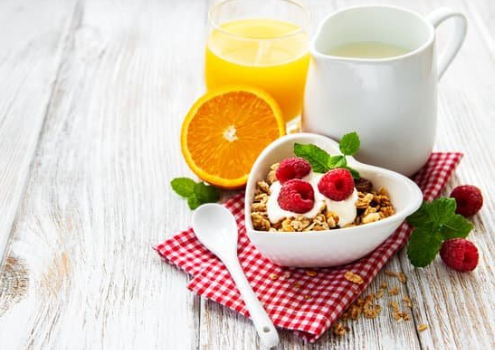Food Before Coffee

We are busy. We are a culture of go-go-go! While accomplishing things can be a good thing, our go-go-go culture comes with a cost. Often that cost is our health. Getting back to the basics with our habits can be a great start with improving our health.
Remember when we believed that breakfast was the most important meal of the day? Then we got too busy to eat breakfast, and then all the information about intermittent fasting came about, and we told ourselves that skipping breakfast was on purpose for our health. Then we find our blood sugar and our nervous system out of whack from skipping breakfast and fueling up on coffee and energy drinks. Then we get home and indulge in a large dinner to catch up on calories and energy which then forces our body to do a lot of digesting at one time, which can be problematic for more reasons than I have time to list in this one post.
While there is some science to support some benefits to intermittent fasting, the truth is that most people are not doing this the correct way, and many studies on IF are done on men, not women, and therefore the effects are not beneficial for everyone. That is a topic for another time. For now, I just want to emphasize the importance of not only eating breakfast, but taking in food as fuel, before we fuel up on caffeine.
Sure, coffee has several proven health benefits, when used in moderation, but drinking coffee on an empty stomach can be problematic when done consistently over time, thereby outweighing its benefits.
Our stomach contains hydrochloric acid, which is needed to digest our food. Coffee kick starts hydrochloric acid production into overdrive, especially if there is no food in the stomach. When this is done often enough, the body loses interest in producing hydrochloric acid on its own.
Did you also know that as we age, our bodies produce less hydrochloric acid? This is why we see more gastrointestinal issues like heartburn, acid reflux, bloating, IBS, and poor nutrient absorption happen with age. Couple this natural age-related effect of decreasing HCl production, with years of coffee in the morning before food, and you can see why acid reducing medications are one of the most used medications on the market.
It is not necessarily the caffeine in coffee that is the problem however. These issues are just as common with decaf coffee. Coffee contains various acids, enzymes and oils that contribute to the damage. These components contribute to gastric emptying, which gets food out of your stomach more quickly. When food moves through you faster, there is less time to absorb the nutrients properly and therefore can cause nutrient deficiencies. Our kidneys need time to absorb calcium, magnesium, zinc, and other important minerals. Did you know that magnesium deficiency is linked to various health conditions including migraines, high blood pressure, heart disease, infertility, osteoporosis, migraines, and anxiety?
So, what can we do about it?
Eat breakfast before coffee!
My friend asked me, “but what if coffee is my breakfast?” I told her, “It’s time to build a better habit.”
Real food is intended to be our real fuel. Make time to start your day with a balance of protein, complex carbohydrates that contain fiber, and healthy anti-inflammatory fats to get you going. For busy people, this may take some planning to accomplish. You may need to fix a big batch of egg muffins on the weekend for easy ‘grab-and-go’ on the weekdays. Or consider making overnight oats with protein, the night before so there is less time needed to make breakfast in the morning. Nowadays, there are plenty of good quality protein bars or protein drinks on the market that can be used in a pinch. Some protein products, however, aren’t as quality as you would think, so be sure to read ingredient labels and pay attention to added sugars and where the sugar is coming from, as well as what the fat and protein source is coming from.
Get back to believing that breakfast is the most important meal of the day. Once you have fueled up on proper nutrition, then enjoy your ‘cuppa-joe,’ (without the high amounts of added sugar, of course).
In health,
Dana Ruch, CNS, MS
